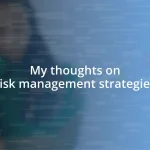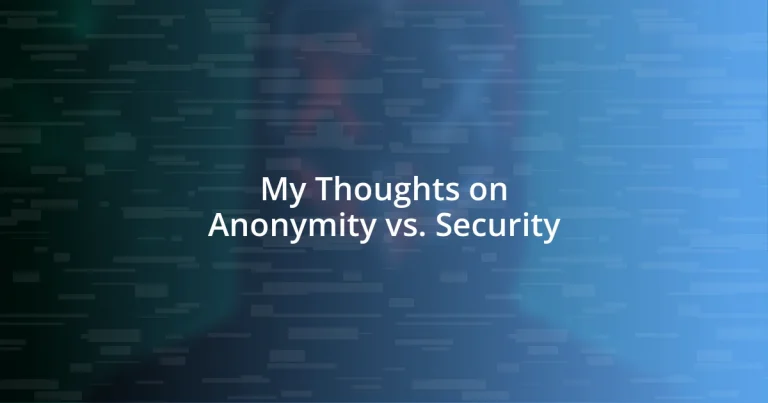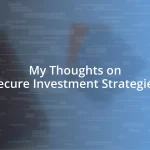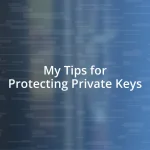Key takeaways:
- Anonymity can empower individuals to express themselves freely while protecting vulnerable people, but it also carries potential risks such as misinformation and trust erosion.
- Security measures like password updates and two-factor authentication are essential to prevent exploitation of anonymity, highlighting the need for awareness of phishing attempts.
- Real-world implications of anonymity include both positive and negative outcomes, as seen in cases like Silk Road and anonymous social media accounts, prompting a discussion on balancing privacy and accountability.
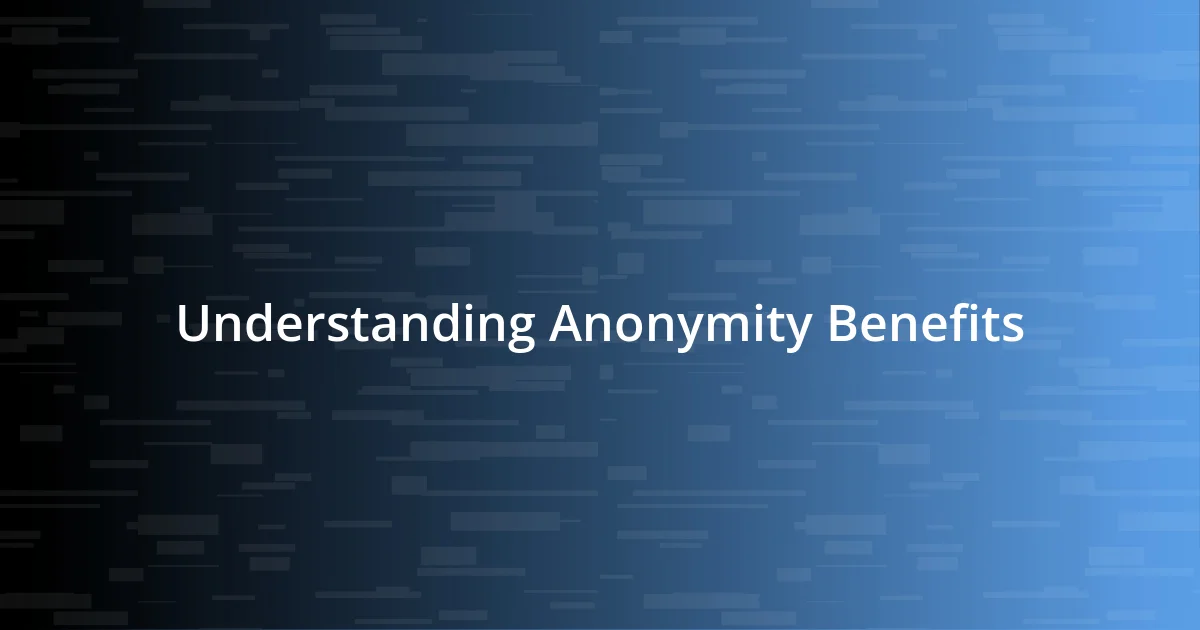
Understanding Anonymity Benefits
Anonymity offers a remarkable sense of freedom. I remember a time when I wanted to express my views on a sensitive community issue without fear of backlash. By sharing my opinions anonymously online, I felt empowered to speak out and connect with others facing similar struggles, highlighting how anonymity can foster open dialogue.
Another significant benefit is the protection it grants to vulnerable individuals. Consider how many people face bullying, discrimination, or harassment; anonymity can serve as a safe haven for them. I once had a friend who was able to seek support for mental health issues through an anonymous forum, which allowed them to share their experiences without the weight of stigma.
Anonymity also encourages creativity and innovation. I’ve noticed that some of my best ideas come when I can brainstorm without the fear of judgment. Isn’t it fascinating that the freedom to explore unique concepts without attaching my name to them can lead to breakthroughs? This factor alone emphasizes how important anonymity can be in fostering an environment where fresh, unfiltered thoughts can thrive.
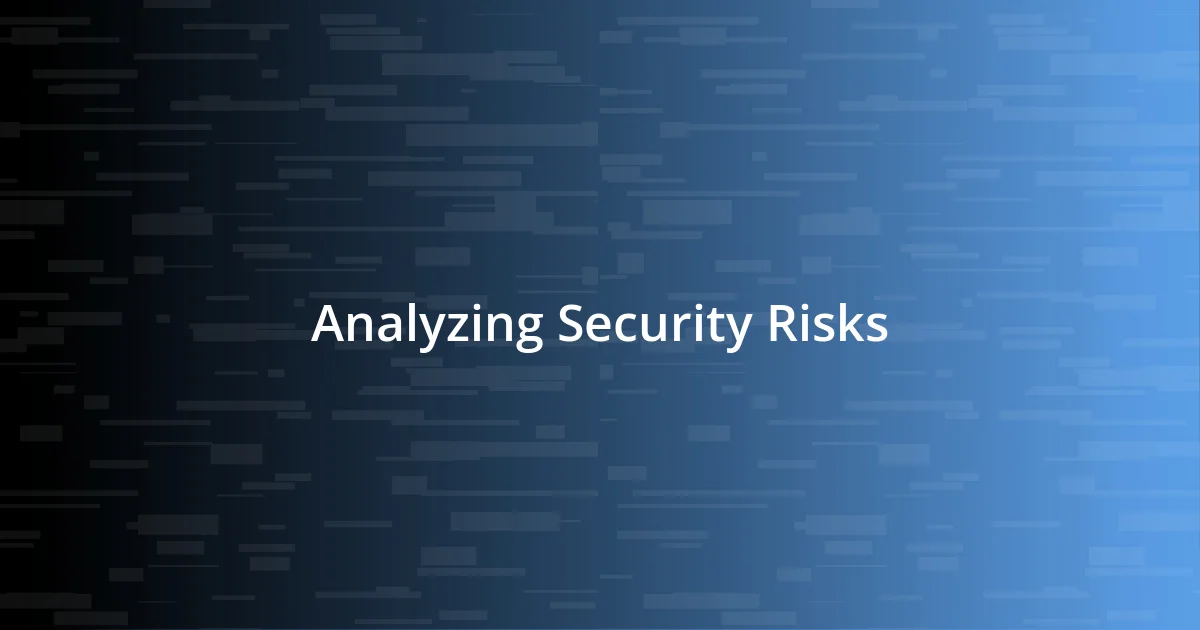
Analyzing Security Risks
Analyzing security risks requires a thoughtful approach, especially in today’s digital landscape. With the rise of cyber threats, it’s essential to understand how anonymity can be exploited. I recall a time when I received a suspicious message on social media from an anonymous account claiming to offer exclusive insights. At first, it seemed harmless, but it dawned on me that cybercriminals often use anonymity to mask their identity while executing schemes. This really highlighted how anonymity can serve as both a shield and a weapon in the wrong hands.
When discussing security risks, one must consider the potential for data breaches and identity theft. People tend to overlook how easily someone can impersonate others when anonymity is on their side. I remember reading about a case where an anonymous user accessed sensitive data under the pretense of being a trusted employee. Can you imagine how devastating that must have been for the organization? It’s mind-boggling to think that anonymity, which can protect legitimate users, can also compromise overall security.
Lastly, anonymous online interactions can lead to the spread of misinformation. Reflecting on the last major event I attended, I noticed countless posts made by anonymous accounts claiming to have insider knowledge. It was shocking to see how quickly false information spread. This experience made me realize that while anonymity can encourage free expression, it also complicates the task of discerning credible sources in a vast sea of opinions. Ultimately, the risks are profound and deserve careful consideration.
| Type of Risk | Explanation |
|---|---|
| Data Breach | Anonymity can facilitate hackers impersonating trusted sources to steal sensitive information. |
| Misinformation | Anonymous accounts often spread false information without accountability. |
| Trust Erosion | When anonymity obscures identity, trust can diminish between users. |
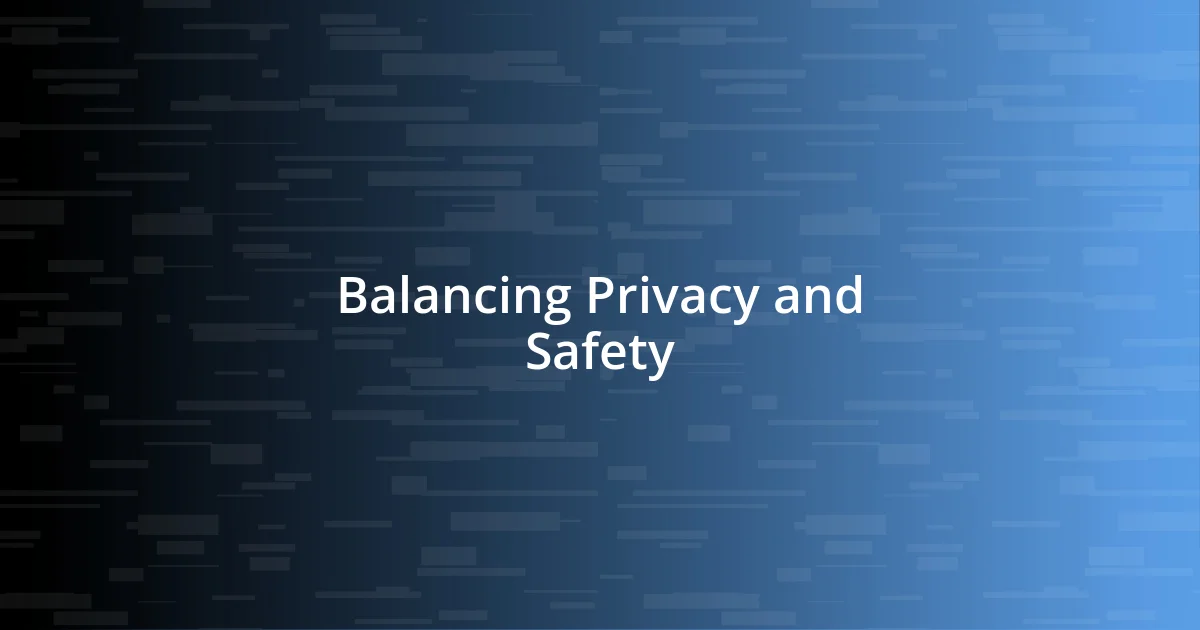
Balancing Privacy and Safety
Striking a balance between privacy and safety is often a challenge. For instance, there was a time when I hesitated to share my thoughts on a public platform due to privacy concerns. But it struck me that when we don’t speak up, we might miss opportunities to foster important conversations. This mindful approach to sharing can sometimes lead people to congregate around safe spaces where they can interact without compromising their identities, yet still feel secure in expressing their views.
But it’s essential to recognize that privacy does come with its own set of risks. Below are some key points that illustrate this balance:
- Personal Security: Anonymity may protect against harassment, but it can also embolden malicious actors who misuse it for harmful intentions.
- Community Trust: While it’s crucial to protect individual identity, the lack of transparency can create an atmosphere of mistrust within communities.
- Informed Consent: When engaging anonymously, individuals may inadvertently share sensitive information without fully understanding the implications.
- Regulatory Challenges: Policymaking efforts to curb online harassment have to navigate the delicate line that protects privacy while ensuring safety.
With these considerations in mind, we begin to see that true balance lies in understanding how privacy and safety can work together rather than in opposition.
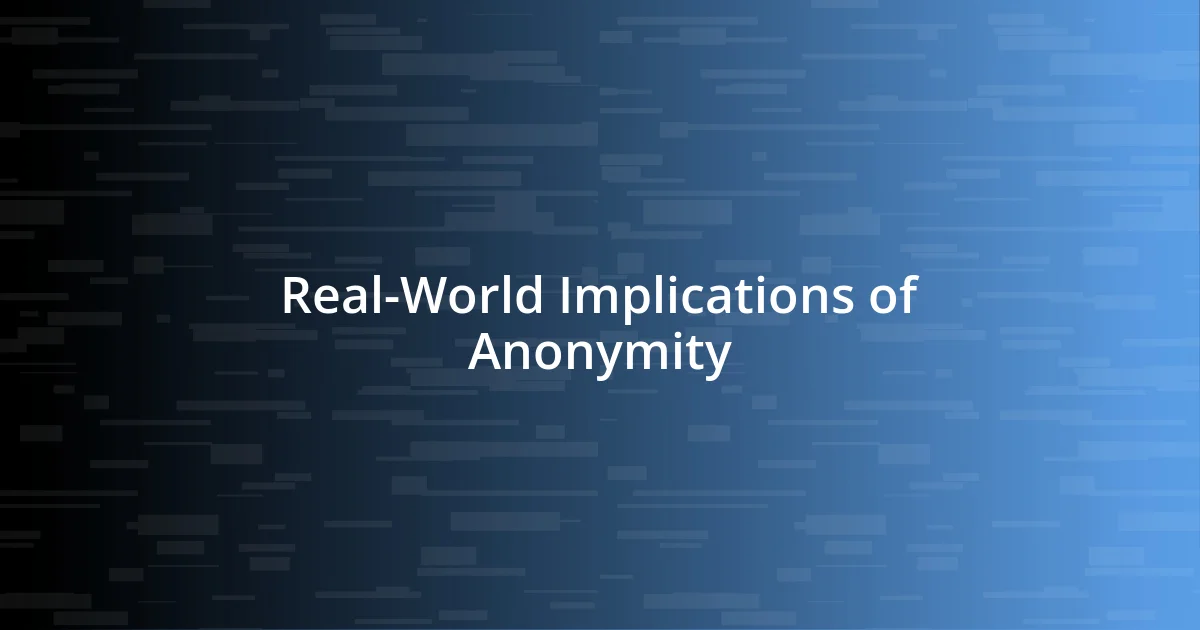
Real-World Implications of Anonymity
Anonymity can significantly shape real-world dynamics, often leading to unexpected consequences. I remember a friend sharing their experience of participating in an anonymous online forum where users could vent their frustrations. Initially, it was a safe space, but it quickly escalated into a toxic environment. Negative comments started piling up, and it made me wonder—does anonymity really promote honesty, or does it just create a breeding ground for harmful behavior?
The implications of anonymity extend far beyond personal experiences. In a professional context, I’ve seen how anonymous feedback tools can lead to important insights but can also enable workplace gossip. A company I once worked for decided to implement an anonymous suggestion box, thinking it would encourage open communication. Instead, the feedback often devolved into personal attacks rather than constructive criticism. Did the anonymity foster genuine dialogue, or did it simply shield individuals from accountability?
Moreover, I can’t help but think about the emotional toll that anonymity can take on individuals. I once encountered a blog post filled with hurtful comments, all from anonymous users. It struck me how easy it was for people to bypass empathy when their identities were concealed. It makes one ponder: could we cultivate more compassion and understanding in our online interactions if we stripped away the layers of anonymity? The real-world implications are complex, and the way we handle anonymity can either bridge connections or widen divides.
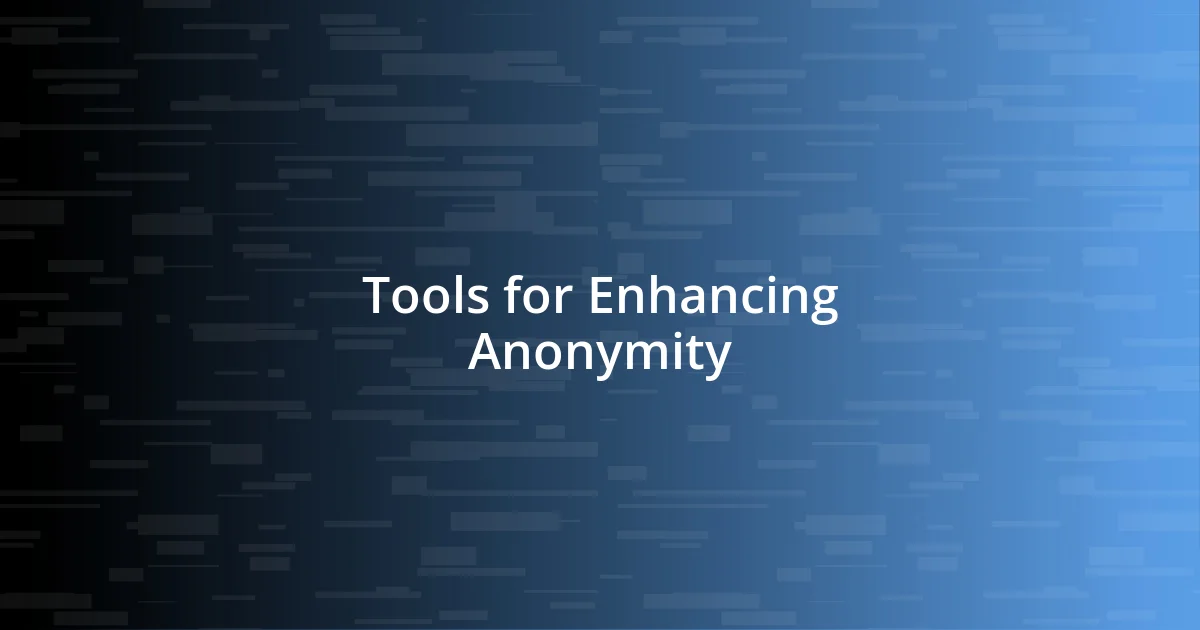
Tools for Enhancing Anonymity
The internet provides various tools to enhance our anonymity, and I often find myself exploring these options to safeguard my privacy. One such tool is the use of virtual private networks (VPNs). I remember setting up a VPN for the first time; it felt somewhat empowering to browse the web without my actions being easily traceable. However, I sometimes wonder if the peace of mind it gives me comes with any hidden drawbacks.
Another powerful way to protect anonymity is through the use of secure browsers, like Tor. I was skeptical at first, thinking that accessing certain websites would be slower and more complicated. But once I tried it, I appreciated the additional layer of privacy it offered. Browsing in a way that keeps my activities hidden from prying eyes was liberating—though it also raised questions about who else might be using this freedom for less savory purposes.
I think encrypted messaging apps are essential for anyone looking to communicate without leaving a digital footprint. Once, during a sensitive conversation with a close friend, we switched to Signal to ensure our discussion remained private. The reassurance that our messages couldn’t be intercepted made the exchange feel significantly safer. Yet, I also ponder: does this reliance on encryption foster a sense of invulnerability, or does it create an illusion of security?
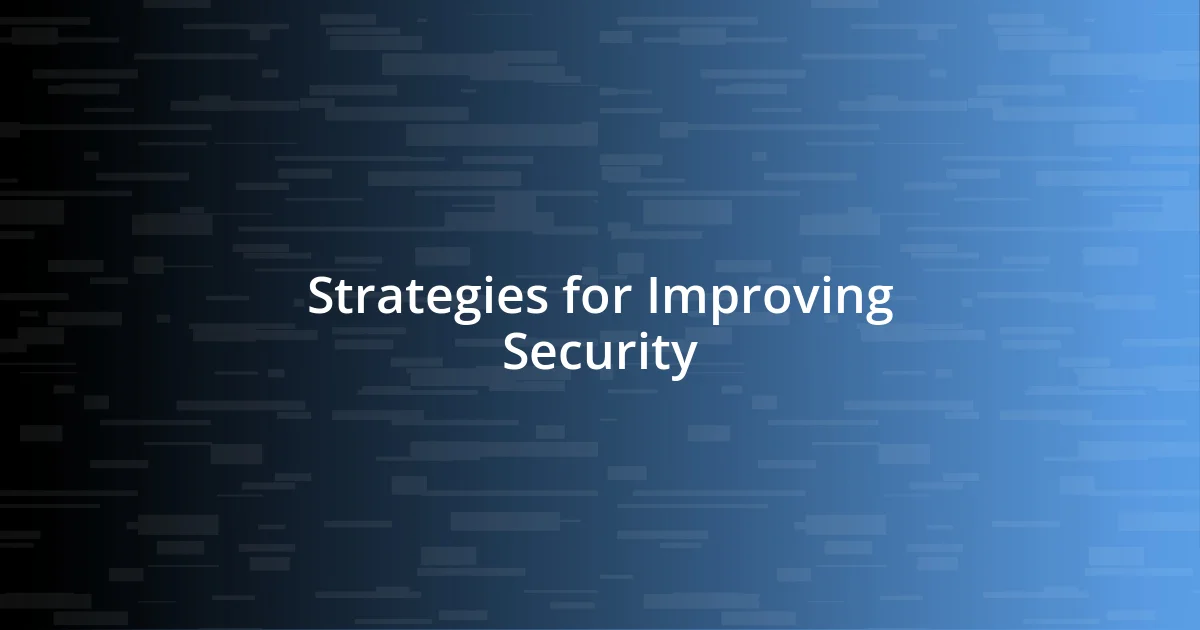
Strategies for Improving Security
To improve security effectively, one strategy I often emphasize is regular password updates. I’ll never forget the time I realized my go-to password had been compromised in a data breach; the shock left me rethinking my entire approach to digital security. By changing my passwords every few months and using a password manager, I’ve managed to feel much more secure in my online activities. Have you ever felt that rush of anxiety when you suspect your accounts are at risk?
Implementing two-factor authentication (2FA) is another excellent security measure. I remember setting it up on my email account and thinking it would be a hassle, but it turned out to be quite the opposite. That extra layer of security provided me with peace of mind that I hadn’t expected. It truly makes me wonder—why isn’t everyone using 2FA when it’s so easy and effective?
Finally, the importance of being aware of phishing attempts can’t be overstated. I recently received an email that appeared to be from my bank, asking me to verify my account details. My instincts kicked in, and instead of clicking the link, I called my bank directly. In that moment of hesitation, I realized how easily one can be deceived. Engaging in regular training on recognizing such threats can empower individuals to safeguard their information. Who doesn’t want to feel in control of their security?
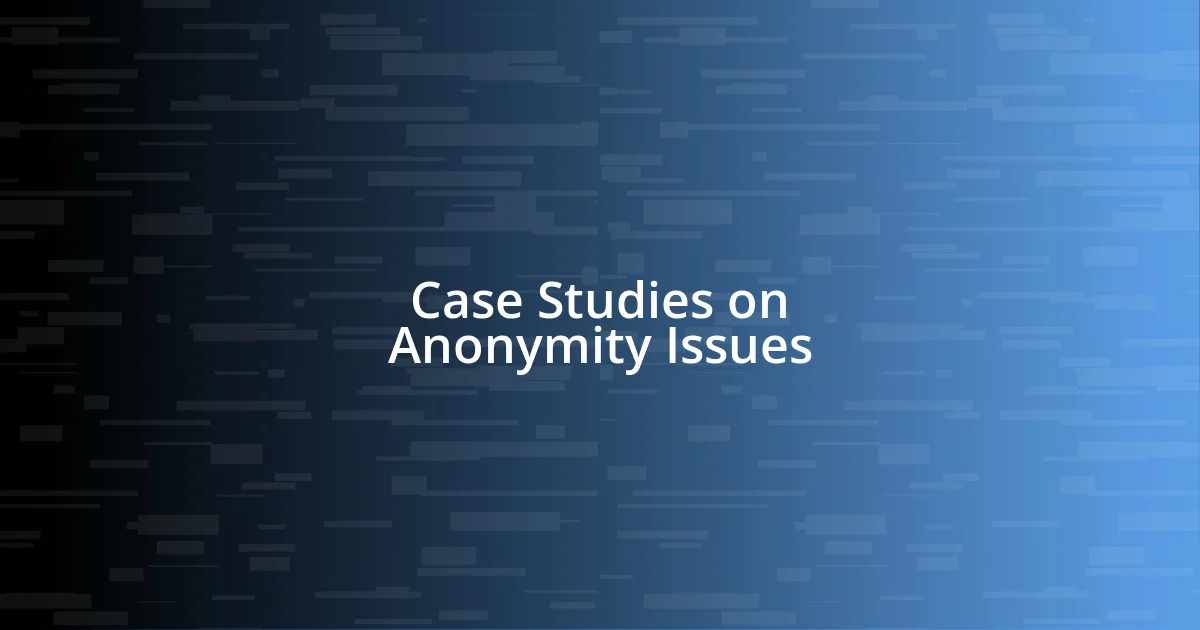
Case Studies on Anonymity Issues
The case of the infamous Silk Road marketplace offers a profound insight into anonymity issues. Silk Road operated on the dark web, allowing users to buy and sell illegal goods while supposedly protecting their identities. Yet, the reality hit hard when the FBI cracked down, arresting its founder. I can’t help but think about the false sense of security so many had while using the site. Did they really believe their actions would remain hidden forever?
Another interesting example is the recent controversy surrounding anonymous social media accounts. I remember logging onto a platform filled with users venting their frustrations using pseudonyms. While it provided a valuable outlet for self-expression, it also became a breeding ground for harassment and misinformation. Sometimes, I wonder: does anonymity empower people to speak freely, or does it allow the worst of humanity to flourish unchecked?
One case that particularly stuck with me was the data leak of public officials’ information. Anonymity can be vital for whistleblowers who need to report wrongdoing without fear of retribution. However, an event where private information was exposed highlighted the risks. I felt a mix of anger and empathy—those brave individuals sought safety, only to have their anonymity compromised. It raised a pressing question in my mind: how can society strike the right balance between protecting anonymity and maintaining accountability?






